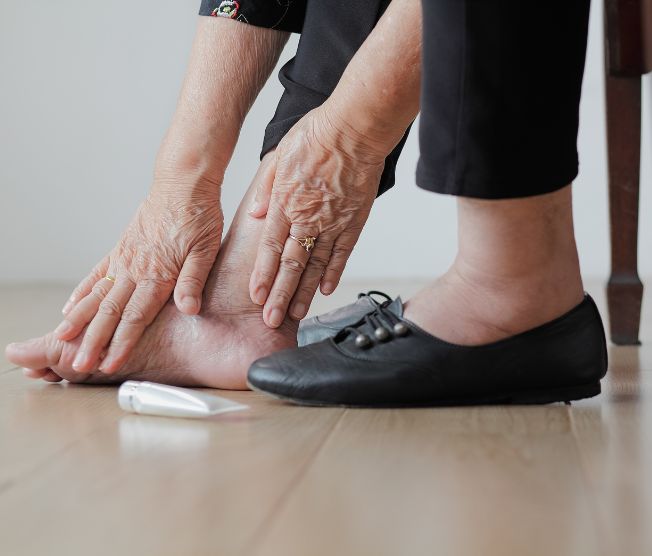 Edema or swelling around the ankles and lower legs can happen at any age but older adults are at higher risk due to health issues, age-related changes and medication usage.
Edema or swelling around the ankles and lower legs can happen at any age but older adults are at higher risk due to health issues, age-related changes and medication usage.
Ankle swelling can signal a more complicated health concern like varicose veins, ulcers, skin breakdown or a liver, kidney or heart issue that should be addressed right away. Edema may also increase an older adult’s fall risks.
What Is Edema?
Unfortunately, edema is not always noticed right away. Instead, you may find that your shoes or socks feel tight or that your ankles lack definition. How the body manages fluid, including blood and in the interstitial space, is behind its development.
With age and other factors, the body starts to have trouble moving blood back to the heart. Related factors can include:
- Leaking blood vessels
- Excessive fluid placing pressure on the blood vessels
- Inflammation
- Infection
- Declining levels of protein in the blood
- Insufficient fluid management from the kidneys
Factors Contributing to Ankle Swelling
Swelling around the ankles can occur in response to hormonal changes, sedentary living or:
- Chronic venous insufficiency, a condition causing blood to accumulate in the blood vessels due to weakened valves in the legs.
- Congestive heart failure, which affects how well the heart pumps blood throughout the body and the kidneys regulate fluid.
- Liver disease, which can affect the amount of albumin or protein circulating in the blood and contribute to fluid leakage.
- Kidney disease, which can cause proteins to leak through the urine and contribute to fluid retention in the body.
- Lymphedema, which can result in the body diverting excess fluid to the lymphatic vessels.
- Medication side effects, including fluid and salt retention or leaky blood vessels. Common sources include high blood pressure medications, beta blockers, calcium channel blockers, hormone replacement therapy, corticosteroids, and NSAIDs.
- Rheumatoid arthritis, with swelling and inflammation around the joints.
Evaluation and Treatment
Due to the potential underlying causes, never treat swollen ankles on your own. Instead, work with your doctor to determine the source and develop a plan. To diagnose edema, your doctor:
- Looks for other symptoms: These may include how well you breathe, which can pinpoint a blood clot, congestive heart failure or a tumor. Your doctor will also examine sources of pain, fatigue and look for signs of infection.
- Examines where the swelling occurs: Occurring on one side, swelling indicates a potential tumor, blood clot or infection limiting blood and fluid circulation.
- Examines skin quality: This includes the presence of fissures, cracks, dryness and ulcers on both sides.
- Will order tests: Prepare to have your pulse and blood pressure assessed and your liver examined. Your doctor may also order urinalysis, creatinine, TSH, glucose, blood and albumin tests or may request X-rays and an ECG to assess heart performance.
From this point, your doctor may recommend a treatment plan that focuses on:
- Addressing underlying health issues involving the heart, liver or kidneys.
- Helping you manage medication side effects or interactions causing fluid retention.
- Keeping your legs elevated for a minimum of 30 minutes, at least three times a day.
- Encouraging circulation through compression stockings, which apply a specified amount of pressure to the ankle and leg area.
- Getting more exercise, particularly focusing on the calf muscles and ankles.
- Dietary changes, including less salt and carbohydrates, and getting more magnesium.
- Improving hydration throughout the day.
- Preventing ulcers and skin breakdown through appropriate skin care.
- Footwear, particularly avoiding shoes that pinch your feet or make it hard to watch.
- Maintaining a healthy weight.
Are you concerned about swelling around the ankles for yourself or a loved one? Bring it to the attention of our medical team at West Hartford Health & Rehabilitation Center today.
« Understanding Memory Loss and Dementia

